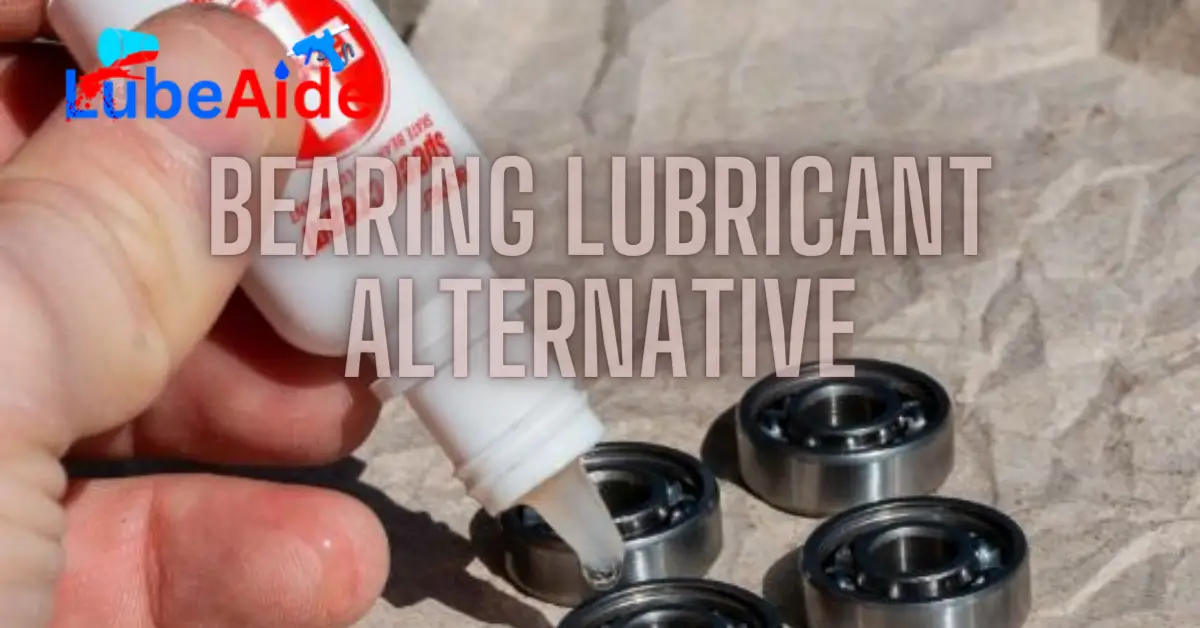In various industries and applications, bearings play a critical role in ensuring smooth and efficient operations. Bearings require proper lubrication to reduce friction and wear, enhancing their lifespan and performance. Traditionally, bearing lubricants have been petroleum-based oils or greases. However, with increasing environmental concerns and the need for more sustainable solutions, industries are exploring alternative bearing lubricants that offer similar or improved performance while being environmentally friendly.
We will delve into the concept of bearing lubricant alternatives, exploring the various options available and their advantages over conventional lubricants. We will discuss how these alternatives contribute to reduced environmental impact, improved energy efficiency, and enhanced equipment reliability. Furthermore, we will examine the challenges associated with adopting alternative lubricants and the strategies to overcome them.
Join us as we explore the exciting world of bearing lubricant alternative and discover how these innovative solutions are revolutionizing industries while paving the way for a more sustainable future.
Need for Alternatives
As the demand for efficient and cost-effective solutions continues to grow, the need for alternatives to traditional bearing lubricants is becoming increasingly important. While traditional lubricants have been used for decades, there are several reasons why alternatives are now being sought after.
Environmental Concerns
One of the primary reasons for seeking alternatives to traditional bearing lubricants is environmental concerns. Traditional lubricants, such as petroleum-based oils, can be harmful to the environment if not disposed of properly. They can also contribute to air pollution and greenhouse gas emissions during production and transportation. In contrast, alternative lubricants, such as vegetable-based oils, can be more environmentally friendly and sustainable.
Cost Efficiency
Another reason for seeking alternatives is cost efficiency. Traditional lubricants can be expensive, especially if they require frequent replacement or maintenance. Alternative lubricants, such as synthetic oils, can offer longer-lasting performance and lower maintenance costs in the long run.
Performance Limitations
Finally, traditional lubricants can have performance limitations that make them unsuitable for certain applications. For example, high-temperature environments may require lubricants that can withstand extreme heat without breaking down. Alternative lubricants, such as ceramic-based oils, can offer improved performance in these types of applications.
Overall, the need for alternatives to traditional bearing lubricants is driven by a combination of environmental concerns, cost efficiency, and performance limitations. As new technologies and materials continue to emerge, the search for better lubrication solutions will continue.
Potential Bearing Lubricant Alternatives

Bio-Based Lubricants
Bio-based lubricants are becoming increasingly popular as an alternative to traditional petroleum-based lubricants. These lubricants are made from renewable resources, such as vegetable oils, and are biodegradable. They are also non-toxic and have a lower environmental impact than traditional lubricants.
One example of a bio-based lubricant is soybean oil. Soybean oil has been found to have good lubrication properties and can be used as a base oil for lubricants. It has also been found to be effective in reducing friction and wear in bearings.
Solid Lubricants
Solid lubricants are another alternative to traditional lubricants. These lubricants are made from solid materials, such as graphite or molybdenum disulfide, and are used as coatings on bearing surfaces. They provide excellent lubrication properties and can withstand high temperatures and pressures.
One advantage of solid lubricants is that they can be used in applications where traditional lubricants may not be suitable, such as in high vacuum or clean room environments. They also have a longer lifespan than traditional lubricants and require less maintenance.
Nano Lubricants
Nano lubricants are a relatively new type of lubricant that use nanoparticles to reduce friction and wear in bearings. These lubricants are made from a base oil that is infused with nanoparticles, such as carbon nanotubes or graphene.
Nano lubricants have been found to provide excellent lubrication properties and can reduce friction and wear by up to 90%. They are also effective in reducing energy consumption and can improve the overall efficiency of machinery.
In conclusion, there are several potential bearing lubricant alternatives available, including bio-based lubricants, solid lubricants, and nano lubricants. Each of these alternatives has its own advantages and disadvantages, and the choice of lubricant will depend on the specific application and requirements of the machinery.
Evaluating Alternatives

Performance Assessment
When evaluating bearing lubricant alternatives, it’s important to consider their performance. The lubricant must effectively reduce friction and wear, resist oxidation and corrosion, and provide adequate protection under various operating conditions. Some alternatives may have lower viscosity or higher temperature resistance, which can affect their performance in certain applications.
To assess performance, one can conduct laboratory tests, field trials, or consult with experts in the field. It’s crucial to evaluate the lubricant’s compatibility with the bearing material, as well as its ability to maintain its properties over time.
Cost-Benefit Analysis
Another important factor to consider is the cost-benefit of the alternative lubricant. While some alternatives may have a higher upfront cost, they may offer long-term savings by reducing maintenance and downtime costs. Additionally, some alternatives may require less frequent lubrication, reducing the amount of lubricant used and the associated costs.
To conduct a cost-benefit analysis, one can compare the cost of the alternative lubricant with the cost of the current lubricant, taking into account factors such as lubrication frequency, maintenance costs, and potential savings in downtime and energy consumption.
Environmental Impact
Lastly, it’s important to consider the environmental impact of the lubricant. Some alternatives may be more environmentally friendly, such as biodegradable lubricants or those made from renewable resources. Others may have a higher environmental impact due to their manufacturing process or disposal requirements.
To evaluate the environmental impact, one can consult with environmental experts or review the lubricant’s material safety data sheet (MSDS) for information on its toxicity, biodegradability, and disposal requirements.
Overall, evaluating bearing lubricant alternatives requires a comprehensive assessment of their performance, cost-benefit, and environmental impact. By considering these factors, one can make an informed decision on which lubricant is the best fit for their application.
Case Studies
Success Stories
Several companies have successfully implemented alternative bearing lubricants in their operations. One such company, a manufacturer of heavy machinery, switched from traditional petroleum-based lubricants to a plant-based lubricant. The plant-based lubricant reduced friction and wear on the bearings, resulting in a 20% increase in bearing life. Additionally, the plant-based lubricant was more environmentally friendly, reducing the company’s carbon footprint.
Another success story comes from a food processing plant that switched to a dry lubricant. The dry lubricant eliminated the need for constant reapplication, reducing downtime and increasing productivity. The dry lubricant also reduced the risk of contamination, ensuring the safety and quality of the food products.
Lessons Learned
While alternative bearing lubricants can provide significant benefits, there are also potential pitfalls to be aware of. One company attempted to switch to a biodegradable lubricant, but found that it was not compatible with their equipment. The company had to replace several bearings and seals, resulting in significant downtime and costs.
Another lesson learned is the importance of proper application and maintenance. One company switched to a synthetic lubricant, but did not properly clean and flush their equipment before application. This resulted in a buildup of debris and contaminants, causing premature bearing failure.
In conclusion, alternative bearing lubricants can provide significant benefits in terms of performance and sustainability, but it is important to carefully consider the specific needs of each application and to properly apply and maintain the lubricant.
Future Trends
Innovation in Lubricant Technology
As the demand for environmentally friendly and sustainable products continues to grow, lubricant manufacturers are exploring new ways to develop lubricants that meet these requirements. One of the most promising areas of research is the use of bio-based lubricants, which are made from renewable resources such as vegetable oils. These lubricants offer several benefits over traditional petroleum-based lubricants, including biodegradability, lower toxicity, and improved performance in extreme temperatures.
Another area of innovation is the use of nanotechnology in lubricants. Nanoparticles can be added to lubricants to improve their performance in a variety of ways, such as reducing friction and wear, increasing load-carrying capacity, and improving thermal stability. For example, graphene-based lubricants have been shown to significantly reduce friction and wear in high-load applications.
Regulatory Impact
Regulations governing the use of lubricants are becoming increasingly strict, particularly in Europe and North America. This is driving lubricant manufacturers to develop products that meet these regulations while still providing the necessary performance characteristics. For example, the European Union’s REACH regulation restricts the use of certain chemicals in lubricants, such as lead and cadmium, which are known to be harmful to human health and the environment.
In addition to regulatory restrictions, there is also growing pressure from customers and consumers to use environmentally friendly and sustainable products. This is leading to the development of lubricants that are biodegradable, non-toxic, and made from renewable resources.
Overall, the future of lubricant technology is focused on developing products that meet the increasing demand for sustainability and performance. By incorporating new materials and technologies, lubricant manufacturers are poised to meet these challenges and provide products that meet the needs of a changing market.
Frequently Asked Questions
Can I use vegetable oil or cooking oil as a substitute for bearing lubricant?
It is generally not recommended to use vegetable oil or cooking oil as a substitute for bearing lubricant. These oils are not specifically designed for the high-speed and high-temperature conditions that PC fan bearings typically operate under. They may not provide adequate lubrication, leading to increased friction and potential damage to the bearings.
What are some alternative lubricants I can use for PC fan bearings?
While it is best to use lubricants specifically formulated for fan bearings, some alternatives that can be considered include lightweight machine oil, sewing machine oil, or electric motor oil. These oils are often suitable for low-friction applications and can provide adequate lubrication for PC fan bearings. However, it is still advisable to check the manufacturer’s recommendations for the specific fan model.
Can I use WD-40 as a substitute for bearing lubricant?
It is generally not recommended to use WD-40 as a substitute for bearing lubricant in PC fans. WD-40 is a multi-purpose penetrating oil, not a long-lasting lubricant. While it can provide temporary lubrication and help displace moisture, it may not offer sufficient protection and longevity required for fan bearings. It is best to use lubricants specifically designed for bearings.
How often should I lubricate PC fan bearings with alternative lubricants?
The frequency of lubrication depends on factors such as the fan’s usage, operating conditions, and the specific lubricant being used. Generally, it is recommended to follow the manufacturer’s guidelines for lubrication intervals. However, with alternative lubricants, it may be necessary to lubricate more frequently as their properties might not offer the same durability as specialized fan lubricants. Regular monitoring of fan performance can help determine if lubrication is needed.
Can I use silicone-based lubricants for PC fan bearings?
Silicone-based lubricants are generally not recommended for PC fan bearings. While they offer good temperature resistance and are often used in other applications, they may not provide sufficient lubrication for the high-speed and high-temperature conditions of fan bearings. It is best to use lubricants specifically formulated for fan bearings.
Final Thought
In the end, when it comes to finding an alternative bearing lubricant for your PC fan or other applications, there are a few options to consider. Remember that proper lubrication is crucial for the smooth operation and longevity of bearings. Always follow the manufacturer’s instructions and use lubricants specifically designed for bearing applications. By choosing the right alternative lubricant and adhering to proper maintenance practices, you can ensure optimal performance and extend the lifespan of your equipment.
Related Topics:
- Is Red and Tacky Grease Good for Wheel Bearings
- How Often Should You Grease Wheel Bearings on a Car
- Is Wheel Bearing Grease Waterproof
- Can You Over Grease Wheel Bearings
- Can You Use Moly Grease in Wheel Bearings
- How to Grease Trailer Bearings With Grease Gun
- Can You Lubricate Timing Belt
- How to Lubricate Sliding Windows


